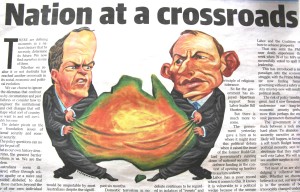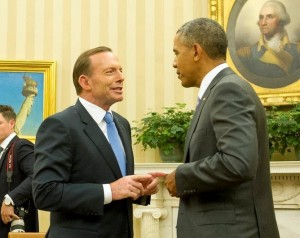Quotes from Australian newspapers:
“The electio n of Argentinian Cardinal Jorge Mario Bergoglio last month as leader of the world’s billion Catholics delivered a litany of firsts – he was the first to take the name Francis, the first Pope from South America and he was the first Jesuit.
n of Argentinian Cardinal Jorge Mario Bergoglio last month as leader of the world’s billion Catholics delivered a litany of firsts – he was the first to take the name Francis, the first Pope from South America and he was the first Jesuit.
Unique among Catholic religious orders, Jesuits take a fourth vow. While they all promise poverty, chastity and obedience, only Jesuits pledge obedience to the Pope.
“Abbott’s Coalition ministry is shaping as a kind of Jesuit jamboree.”
So Pope Francis surprised everyone, not least Australian Jesuits.
A religious order founded in the 16th century and perhaps experienced by few apart from the very rich and the very poor, the Jesuits have been anointed with their own adjective and a popular dictum – ”give me a child until he is seven and I will give you the man”
The separation of church and state may be a given, but through a mix of masculine Christianity and svelte intellectualism, the Jesuits seem to have been able to hard-wire a large slice of the next shift of political leaders.
Such ”power behind the throne” is a curious achievement, given Jesuits retain a reputation as rebels. Like many religious orders, their future is increasingly unclear – there are 138 Australians but no novitiates are taking the decade-long course for ordination as a priest – and the path of the royal commission into sex abuse is unpredictable.
‘Tumultuous history’
But Jesuits have always had a tumultuous history.
The order was founded in 1540 by Ignatius of Loyola, a Basque soldier given to visions. Martin Luther had 23 years earlier nailed his theses to the Wittenberg church door and crank-started the Protestant Reformation. With the Catholic Church’s hegemony over Christianity under challenge, Loyola’s new crew became a leading edge of the Counter-Reformation. The papal bull establishing the order named its task as the ”propagation and defence of the faith and the progress of souls in Christian life and doctrine”.
Apart from his ace in the hole of pledging total obedience to the Pope, Loyola also understood the need to ”grow the market” and put missionary work front and centre. Francis Xavier, one of the five other men who joined Loyola to start the Jesuits in a Parisian church, famously went on to open up the Asian territory to Christianity.
The head of the Society of Jesus, the Father General, is colloquially called ”the Black Pope”. It’s a pejorative term, shaped by the Jesuit’s remarkable history. Although they dismiss such terms as ”God’s marines”, Jesuits were reviled and routinely portrayed as unshaven and Semitic.
‘Hit squad’
Over the centuries, the order was suppressed and banished. Switzerland, for instance, kicked out Jesuits in 1848, allowing them back only in 1973. Initially, much of the fear and loathing resulted from the Jesuit performance as a hit squad during the Counter-Reformation. Besides, maybe there was a touch of envy. Jesuits were far better educated than most contemporary clergy and their intellectual dexterity and talent for fitting morals to suit the occasion, arguing on a case-by-case basis against principles or rules, infuriated many and gave rise to the abusive adjective ”jesuitical”.
(Little wonder then that the ability to switch positions surfaced in Jesuit school debating teams, a skill coincidentally much admired among politicians).
Militarily active
Curiously, since the reforms that followed Vatican II in the 1960s, and the liberation theology that came with it, the order has been perceived by some as anti-establishment, even socialist: South American Jesuits carried machineguns and bullet belts under their cassocks and were routinely accused of fermenting the Castro revolution.
Sydney Morning Herald Damien Murphy April 2013
Jesuits controlling Australia business and politics
The rise of Jesuit-educated politicians in Australia is a remarkable conjunction in political leadership: a situation so rare that it may even be a first in the Western world. The Jesuits educate a lot of students in Australia but there has been only one other precedent that I know of at the state level. Former NSW Liberal premier Nick Greiner is also an old boy of St Ignatius, Riverview.
The relatively higher profile of the Jesuits may be part of the explanation. But the greater part of the explanation lies in the prominence given to Pope Francis and his Jesuit background. Some have attributed his leadership emphasis on simplicity, poverty and inclusiveness and his particular concern for refugees and asylum seekers to the fact that he is a Jesuit.
Never before have there been so many Jesuit-educated men at the heart of Australian politics.
John Warhurst is an emeritus professor of political science at the Australian National University. He was educated by the Jesuits in Adelaide.
Which leader is better than the other or which Jesuit can I choose?
During the three-way Liberal leadership contest between Malcolm Turnbull, Joe Hockey and Tony Abbott, all three men consulted with Jesuit priests.
Mr Turnbull turned to Richard Leonard SJ, boss of the Australian Catholic Bishops film office; Mr Hockey spoke with Michael Ryan SJ, rector of his alma mater, St Aloysius. Mr Abbott turned to his mentor Emmet Costello – the man who advised him to enter the priesthood years ago – now retired, but who once taught at his alma mater, St Ignatius Riverview.
The Catholic order has a long history of producing MPs and Senators, including former deputy prime minister Tim Fischer and former Victoria deputy premier Pat McNamara.
Swings to Jesuit-educated MPs across the country by JAMES MASSOLA
- THE AUSTRALIAN AUGUST 23, 2010
How many of Catholic orders in history have been dissolved by the Pope at the insistence of the Catholic countries in which they worked? 1 The Society of Jesus or the Jesuits. Over 80 times expelled by states and cities for their subversive activity rather than for their charity or educational work. Did their suspension really lead to the death of the Pope who ordered them to be annulled? Clement XIV signed the decree abolishing the Jesuits Order and said “I have signed my death warrant” and in months he was dead. Was this not always an order of wealth and poverty but ultimately power? Was it not this organisation that incorporated into itself the Illuminati? Was the inquisition and attempted assassinations just a mistake of the past?
In 1773, Pope Clement XIV suspended the Jesuit order, declaring the society “perpetually broken up and dissolved.” This extreme measure was began when the Jesuits were recognized by many countries for political interference. Catholic monarchs insisted on their suspension and they were thrown out of most of the European countries. It all began with the war caused by the Jesuits between the Catholic countries of Portugal and Spain.
“As Malcolm Fraser the former Australian Prime Minister recalls in his recent memoirs, when he asked his parents what was wrong with Catholics he was told ‘Well, they are different. They are not Australians; they owe their loyalty to the Pope.'”
Defenders of the society put it like this: “The suppression was no surprise. For 15 years, the society’s enemies, charging heresy, malign influence and lax moral theology, had persecuted the society in Spain, Portugal and France. Finally, the monarchies had convinced Pope Clement XIV to “put out of existence” the Society of Jesus.” I will put it like this: they were in charge of the inquisition and were not apologists or about to compensate anyone and the Catholic countries were so aberrant to this (you could like it to the Jewish death camps in WWII) that they threw open the the places of torture for all to see their work. They were amongst the poor and the rich and intimate power was their aim by whatever means and they were very powerful and are very influential. They were ministers of death to themselves and to others. “From the beginning, Jesuits were trained to accept a form of death, either in sacrificing one’s will through the vow of obedience or as martyred missionaries.”
Riddle or Revelation, Spirit of truth or confusion?
Revelation 17:3 So he carried me away in the spirit into the wilderness: and I saw a woman sit upon a scarlet coloured beast, full of names of blasphemy, having seven heads and ten horns.
17:4 And the woman was arrayed in purple and scarlet colour, and decked with gold and precious stones and pearls, having a golden cup in her hand full of abominations and filthiness of her fornication:
17:5 And upon her forehead [was] a name written, MYSTERY, BABYLON THE GREAT, THE MOTHER OF HARLOTS AND ABOMINATIONS OF THE EARTH.
17:6 And I saw the woman drunken with the blood of the saints, and with the blood of the martyrs of Jesus: and when I saw her, I wondered with great admiration.
17:7 And the angel said unto me, Wherefore didst thou marvel? I will tell thee the mystery of the woman, and of the beast that carrieth her, which hath the seven heads and ten horns.
17:8 The beast that thou sawest was, and is not; and shall ascend out of the bottomless pit, and go into perdition: and they that dwell on the earth shall wonder, whose names were not written in the book of life from the foundation of the world, when they behold the beast that was, and is not, and yet is.
17:9 And here [is] the mind which hath wisdom. The seven heads are seven mountains, on which the woman sitteth.
17:10 And there are seven kings: five are fallen, and one is, [and] the other is not yet come; and when he cometh, he must continue a short space.
17:11 And the beast that was, and is not, even he is the eighth, and is of the seven, and goeth into perdition.
‘Those who place themselves under God’s control, to be led and guided by him, will catch the steady trend of the events ordained by him to take place.’